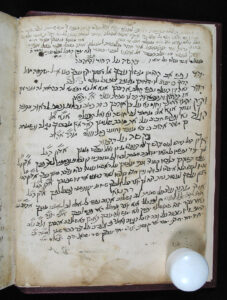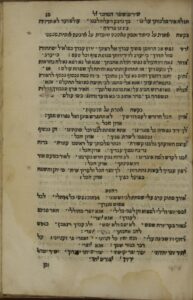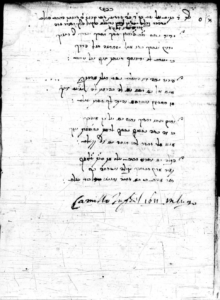| Source (Hebrew) | Translation (English) |
|---|---|
יְדִיד נֶֽפֶשׁ אָב הָרַחֲמָן, מְשׁוֹךְ עַבְדְּךְ אֶל־רְצוֹנֶֽךָ, יָרוּץ עַבְדְּךָ כְּמוֹ אַיָּל, יִשְׁתַּחֲוֶה אֶל מוּל הֲדָרֶֽךָ, יֶעֱרַב לוֹ יְדִידוּתֶֽיךָ, מִנֹּֽפֶת צוּף וְכׇל־טָֽעַם׃ |
Beloved of the soul, Source of Compassion, draw your servant to your Will; then your servant will hurry like a deer to bow before your majesty; Your friendship will be sweeter than the dripping of the honeycomb and any taste. |
הָדוּר נָאֶה זִיו הָעוֹלָם, נַפְשִׁי חוֹלַת אַהֲבָתֶֽךָ, אָנָּא אֵל־נָא רְפָא נָא לָהּ, בְּהַרְאוֹת לָהּ נֹֽעַם זִיוֶֽךָ, אָז תִּתְחַזֵּק וְתִתְרַפֵּא, וְהָֽיְתָה לָּהּ שִׂמְחַת עוֹלָם׃ |
Majestic, Beautiful, Radiance of the Universe, my soul pines for your love. Please, O God, please heal her now[1] cf. Numbers 12:13. by showing her the pleasantness of your radiance; then she will be strengthened and healed, and eternal gladness will be hers. |
וָתִיק יֶהֱמוּ נָא רַחֲמֶֽיךָ, וְחוּסָה נָּא עַל בֵּן אֲהוּבֶֽךָ, כִּי־זֶה כַּמָּה נִכְסוֹף נִכְסַֽף, לִרְאוֹת בְּתִפְאֶֽרֶת עֻזֶּֽךָ, אָנָּא אֵלִי חֶמְדַּת לִבִּי, חֽוּסָה נָּא וְאַל תִּתְעַלָּם׃ |
Enduring One, may your mercy be aroused and please take pity on the son of your beloved, because it is so very long that I have yearned intensely to speedily perceive the splendor of your strength; only these my heart desired, so please take pity and do not conceal yourself. |
הִגָּלֶה נָא וּפְרוֹשׂ חָבִיב עָלַי אֶת־סֻכַּת שְׁלוֹמֶֽךָ, תָּאִיר אֶֽרֶץ מִכְּבוֹדֶֽךָ, נָגִֽילָה וְנִשְׂמְחָה בָּךְ, מַהֵר אָהוּב כִּי בָא מוֹעֵד, וְחָנֵּֽנוּ כִּימֵי עוֹלָם׃ |
Please, my Beloved, reveal yourself and spread upon me the shelter of your peace; illuminate the earth with your glory, that we may rejoice and be glad with you; hasten, show love, for the time has come. Let your gentle favor grace us as in olden days. |
“Yedid Nefesh” is a piyyut first published in the Sefer Haḥaredim (1588) of Rabbi Elazar Moshe Azikri (1533-1600). The authorship of the piyyut is not completely certain. A version of the piyyut “with noteworthy text, spelling and pointing” may be found on folio 146 (verso) of Samuel b. David b. Solomon’s Commentary On the Book of Numbers (ca. 1437 CE).[2] Find Stefan C. Reif’s The Hebrew Manuscripts at Cambridge University Libraries: A Description and Introduction Cambridge: Cambridge University Press, 1997, page 93. Reif attributes Yedid Nefesh to Azkiri. Presumably, the text must have been added to the 15th century manuscript sometime after the publication of Sefer Haḥaredim. It would be very nice to see a digitized image of this manuscript page from the CUL collection! Yedid Nefesh also appears in Moscow – Russian State Library, Ms. Guenzburg 320 as the last of “a polyglot of at least 24 different items written in different stages” (find Dr. Ezra Chwat, גילוי מילתא בעלמא Giluy Milta B’alma). Yedid Nefesh appears there under the following headline: ד’ בתים של שם בן ד’ ב”ה ששמענו מפי קדוש מכבוד החכם השלם מהר”ר גדליה בן לגאון המושלם המקובל [הא]לקי כמהר”ר משה קורדוברו זצק”ל”. Ezra Chwat: “This doesn’t necessarily qualify that Gedalia Cordovero (1562–1625, son of Moshe Cordovero, ReMaK), is the author. To be precise, it attributes to him the oral transmission.” Meir Benayahu in Yosef Behiri, 1991, p.544, “asserts that this witness must have heard the poem from Gedalia Cordevero after his descent [from Safed] to Italy in 1583. This would be a full five years before Ḥaredim was written (and 17 years before [it was] published). Having been transmitted orally for some time might explain some of the variants. In any case Gedalia Cordevero and Elazar Azkari are likely to have been well acquainted.” The piyyut has appeared with a number of variations in various siddurim.
The variation and translation of Yedid Nefesh here can be found in Siddur on the Hill for Friday Night (Ḥavurah on the Hill/Vilna Shul, Boston, 2010).
Source(s)

Yedid Nefesh (JTSA MS3541, fol.5v) yedid nefesh – sefer haḥaredim 43a (Venice 1597)

Notes
| 1 | cf. Numbers 12:13. |
|---|---|
| 2 | Find Stefan C. Reif’s The Hebrew Manuscripts at Cambridge University Libraries: A Description and Introduction Cambridge: Cambridge University Press, 1997, page 93. Reif attributes Yedid Nefesh to Azkiri. Presumably, the text must have been added to the 15th century manuscript sometime after the publication of Sefer Haḥaredim. It would be very nice to see a digitized image of this manuscript page from the CUL collection! |

“יְדִיד נֶפֶשׁ | Yedid Nefesh, a piyyut transmitted by Elazar ben Moshe Azikri (ca. 16th c.) translated by Rabbi Sam Seicol” is shared through the Open Siddur Project with a Creative Commons Attribution-ShareAlike 4.0 International copyleft license.











Leave a Reply